Jeff Beck, 1944-2023
A legendary guitarist is gone at 78.
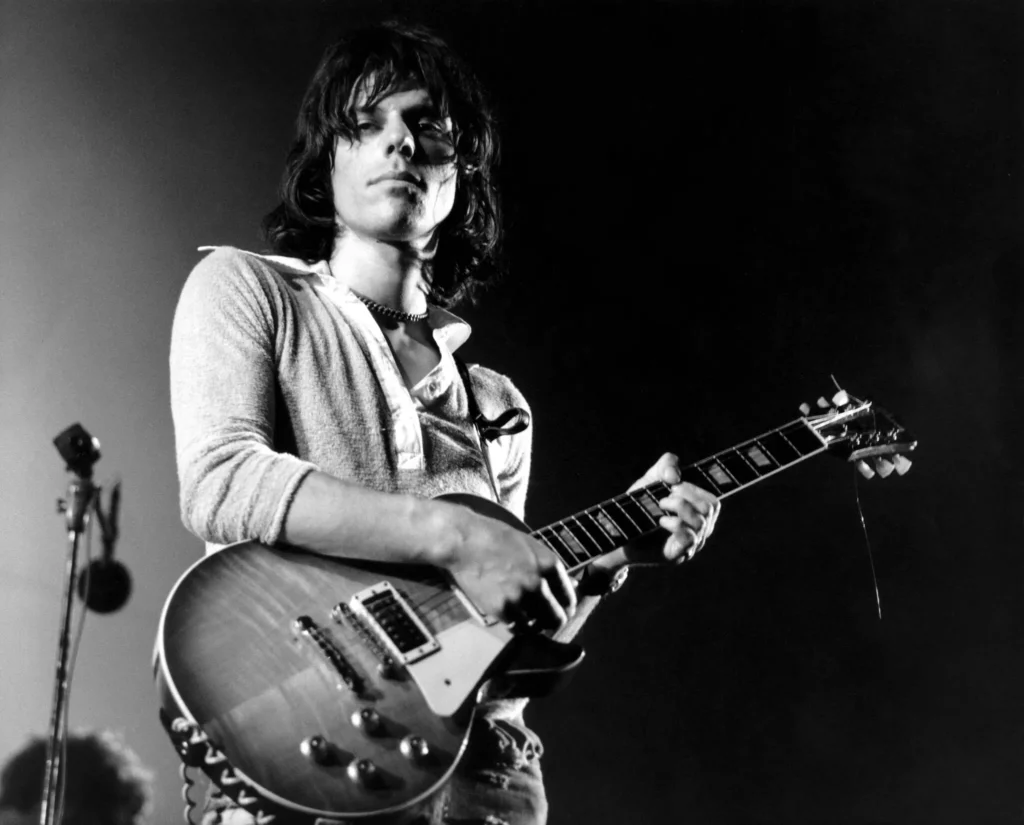
Rolling Stone (“Jeff Beck, Rock’s Quiet Guitar Virtuoso, Dead at 78“):
JEFF BECK, THE blues-rock innovator and two-time Rock and Roll Hall of Fame inductee who revolutionized how the guitar is played, died Tuesday at the age of 78.
Beck’s family confirmed the former Yardbirds guitarist’s death Wednesday. “On behalf of his family, it is with deep and profound sadness that we share the news of Jeff Beck’s passing,” Beck’s family said in a statement. “After suddenly contracting bacterial meningitis, he peacefully passed away yesterday. His family asks for privacy while they process this tremendous loss.”
Beck, an eight-time Grammy winner, was twice inducted into the Rock and Roll Hall of Fame — both as a member of the Yardbirds as well as for his work with his own Jeff Beck Group.
Led Zeppelin’s Jimmy Page, Beck’s Yardbirds bandmate who inducted the guitarist into the Rock Hall in 2009, wrote on social media Wednesday, “The six stringed Warrior is no longer here for us to admire the spell he could weave around our mortal emotions. Jeff could channel music from the ethereal. His technique unique. His imaginations apparently limitless. Jeff I will miss you along with your millions of fans. Jeff Beck Rest in Peace.”
“Jeff Beck has the combination of brilliant technique with personality,” the Heartbreakers’ Mike Campbell wrote when Beck placed Number Five on Rolling Stone’s list of the 100 Greatest Guitarists. “It’s like he’s saying, ‘I’m Jeff Beck. I’m right here. And you can’t ignore me.’ Even in the Yardbirds, he had a tone that was melodic but in-your-face — bright, urgent, and edgy, but sweet at the same time. You could tell he was a serious player, and he was going for it. He was not holding back.”
Before Beck discovered guitar, his mother had wanted him to play the piano. But once his parents saw how Beck, who was born in Surrey, England on June 24, 1944, took to the guitar, they allowed it. “[My parents] complained [about the guitar], but they didn’t stop me,” he told Rolling Stone in 2018. “I suppose they thought, ‘If he’s got the guitar, he’s not going out stealing.’ The only friends I had were pretty low-life; most of them were one step away from jail.” Eventually, Beck bonded with another boy who was a budding guitarist in his neighborhood, Jimmy Page. The two musicians shared a passion for rockabilly music (Beck credited his older sister with buying the records that shaped his taste) and would try to impress each other with their skills.
He attended London’s Wimbledon Art College, where he played with British musician Lord Sutch. He’d later audition for the Yardbirds at the encouragement of Page, who had become a successful session guitarist, in 1965 after Eric Clapton quit the group for becoming too poppy. Nevertheless, Beck remembered frontman Keith Relf as being something of a blues purist. “I thought, ‘You can be a purist and you can be poor; I’m gonna do what I think is best,’” he said. Beck had a natural penchant for psychedelia, experimentalism, and jazz (two of his favorite musicians in the Sixties were Eric Dolphy and Roland Kirk) and his avant-garde side fit perfectly with the pop scene in the Sixties. The Yardbirds soon recorded the hits “Heart Full of Soul” and “Evil Hearted You,” both of which charted in the U.K., which they followed up with “Shapes of Things” and “Over Under Sideways Down,” their first U.S. chart hits.
Page joined the band in 1966, first on bass and then eventually as a co-lead guitarist. The Yardbirds performed “Stroll On” (a version of Jimmy Burnette’s “Train Kept a-Rollin‘”) for a sequence in Michelangelo Antonioni’s film Blow-Up, in which Beck smashed a guitar a la Pete Townshend. “Well, clearly the Who was asked to do it and they said no,” Beck recalled. “I wasn’t in the position to argue when they paid us a lot of money. … [Antonioni] just said, ‘You’ll smash your guitar.’ And I said, ‘No, I won’t.’ It was a sunburst Les Paul. He said, ‘We’ll buy you another one.’ He didn’t grasp that you don’t do that to most guitars. So they rented six beginner guitars, and they were so cheap they came in a clear plastic bag.”
But Beck would no longer be in the band by the time the film came out. He quit in November 1966 after an illness and suffering a breakdown. In 1967, he recorded the pop single “Hi Ho Silver Lining,” a track on which he sang lead vocals, that became a hit, while its B-side, “Beck’s Bolero,” foreshadowed Led Zeppelin as it featured Page and bassist John Paul Jones accompanying Beck alongside the Who’s Keith Moon and pianist Nicky Hopkins. That same year, he founded the heavy-blues focused Jeff Beck Group, which featured singer Rod Stewart and future Rolling Stones guitarist Ron Wood on bass. The group issued two albums — 1968’s Truth and 1969’s Beck-Ola — and turned down an appearance at Woodstock before Beck disbanded the ensemble, leading Stewart and Wood to join Faces.
“Jeff Beck was on another planet. He took me and Ronnie Wood to the USA in the late 60s in his band the Jeff Beck Group and we haven’t looked back since,” Stewart tweeted Wednesday. “He was one of the few guitarists that when playing live would actually listen to me sing and respond. Jeff, you were the greatest, my man. Thank you for everything. RIP.”
Beck next hoped to form a group with Vanilla Fudge’s Tim Bogert and Carmine Appice but a car crash, in which he fractured his skull, delayed the group coming together for a year and a half. In that time, Beck decided to explore his interest in Motown and sat in on some of Stevie Wonder’s sessions for Talking Book. At one point, Beck started playing the drums and when Wonder walked in, he liked the groove and wrote “Superstition” around it. With Bogert and Appice in another group at the time, Beck formed the Jeff Beck Group, which put out two more albums with a funkier sound to them, before finally assembling the power trio Beck, Bogert, and Appice in 1972. They lasted only about two years, though Beck remembered BBA’s version of “Superstition” as “a great heavy metal song.”
When Beck reemerged, he had moved on from blues rock to instrumental jazz-fusion. His 1975 album, Blow by Blow, was a surprise hit, reaching Number Four in the U.S. and going platinum. Beatles producer George Martin helmed the album, and Beck later credited him with salvaging his career. “I thought, ‘This sounds like we’re playing in the room — it’s clear and fabulous,’” Beck later said of the sound of Blow by Blow. “That first album was a joy.” He supported the record by touring with the Mahavishnu Orchestra in 1975 and releasing Wired, a collaboration with Mahavishnu keyboardist Jan Hammer, the following year. He took a few years off and came back with another Hammer collaboration, There and Back, in 1980.
Perhaps worried he’d become doomed to guitar-nerd oblivion, he teamed with Stewart again on 1985’s Flash album for a cover of “People Get Ready,” which became a hit. That album’s “Escape,” an instrumental, won him the Best Rock Instrumental Performance Grammy the following year. He’d earn another Grammy four years later with Jeff Beck’s Guitar Shop With Terry Bozzio and Tony Hymas.
“I was glad on the one hand that guitar was still king,” Beck once said of the Eighties. “[Guitarists] were flying a great flag for the guitar. … I had every respect for Vai and Eddie Van Halen. Great. Let them have that. As long as it doesn’t encroach on my style — and it didn’t — I was happy.”
He spent the rest of the Eighties working as a guest musician, adding solos to albums by Tina Turner, Mick Jagger, and Jon Bon Jovi. But he had trouble replicating his success as a solo artist for decades. The Nineties found him bouncing from rockabilly on 1993’s Crazy Legs to techno, on 1999’s Who Else!
As Slash told Rolling Stone in a feature where guitarists discussed their favorite guitarists, “It’s a lot easier to appreciate Beck’s guitar playing if you’re a guitar player. He just has such a natural control over the instrument. It’s the ability to make it do something that you’ve never heard anybody else do. Blow by Blow is the album I had when I was a kid. He would go from love songs to a really blistering, hard-rock, heavy-sounding guitar without ever going over the top.”
Soundgarden’s Kim Thayil added, “Jeff Beck always comes to mind. He’s an incredibly proficient guitarist, but he isn’t Mr. Pedant. The late Seventies to late Eighties were full of guitarists who were preoccupied with technique, like the guitar wasn’t a voice but a tool to be mastered. Jeff Beck wasn’t that way — he used it as a microphone. He was confident.” (In that same feature, Beck credited Django Reinhardt as his chief inspiration.)
In 2009, 17 years after Beck was inducted into the Rock and Roll Hall of Fame as a member of the Yardbirds, he delivered one of the greatest induction speeches of all time when he reentered the Rock Hall for his solo work. “Someone told me I should be proud tonight. But I’m not, because they kicked me out. They did. Fuck them,” he quipped at the 1992 ceremony. “I couldn’t believe I was even nominated,” Beck told Rolling Stone at the time. “I thought the Yardbirds was as close as I’d get to getting in. I’ve gone on long after that and gone through different musical changes. It’s very nice to hear that people have been listening.”
Although Beck made his initial mark in the British Invasion and pioneering blues-rock, the virtuosic guitarist continued to push his musicianship into other genres, from jazz fusion to trance (“Rollin’ and Tumblin’” with Imogen Heap) to orchestral rock (2010’s Emotion and Commotion) to heavy metal; in 2022, he appeared on the title track of Ozzy Osbourne’s Patient Number 9. “Having someone like Jeff Beck play on my album is just incredible, a total honor. There’s no other guitar player that plays like him and his solo on ‘Patient Number 9’ is just jaw-dropping,” Osbourne said at the time.
Over the past 30 years, Beck also served as an all-star collaborator for artists ranging from Seal and Kate Bush to Roger Waters, Morrissey, and ZZ Top. (“Who’s gonna say no when I got the call? I’d be proud that someone remembered I was even alive,” Beck joked to Rolling Stone about his guest appearances.) In what was his final album during his lifetime, Beck and actor Johnny Depp — a longtime friend — released the album 18, a largely covers LP featuring the duo’s interpretations of songs by the Beach Boys, the Velvet Underground, Marvin Gaye, and John Lennon.
Steven Van Zandt, who recently performed with Beck and Depp, paid tribute to Beck on Wednesday, and wrote, “Not only was he a major influence, and his genius an infinite source of joy my entire lifetime, he was in great spirits when we spoke a few weeks ago having done a flawless show with Johnny the night before at the Capitol. Unreal.”
As a solo artist, Beck also remained prolific and vital: He won seven of his eight career Grammy Awards from 1989 onward, including a dominating streak of wins and nominations in the Best Rock Instrumental Performance over the first decade of the 2000s.
BBC (“Jeff Beck: British guitar legend dies aged 78“):
Jeff Beck, one of the most influential rock guitarists of all time, has died at the age of 78.
The British musician rose to fame as part of the Yardbirds, where he replaced Eric Clapton, before forming the Jeff Beck group with Rod Stewart.
His tone, presence and, above all, volume redefined guitar music in the 1960s, and influenced movements like heavy metal, jazz-rock and even punk.
[…]
Speaking when he was inducted to the Rock and Roll Hall of Fame for the second time in 2009, Beck – said: “I play the way I do because it allows me to come up with the sickest sounds possible.”
“That’s the point now, isn’t it? I don’t care about the rules.
“In fact, if I don’t break the rules at least 10 times in every song, then I’m not doing my job properly.”
Guardian (“Legendary rock guitarist Jeff Beck dies aged 78“):
Jeff Beck, the celebrated guitarist who played with the Yardbirds and led the Jeff Beck Group, has died aged 78, his representative has confirmed.
[…]
Often described as one of the greatest guitarists of all time, Beck – whose fingers and thumbs were famously insured for £7m – was known as a keen innovator. He pioneered jazz-rock, experimented with fuzz and distortion effects and paved the way for heavier subgenres such as psych rock and heavy metal over the course of his career. He was an eight-time Grammy winner, recipient of the Ivor Novello for outstanding contribution to British music and was inducted into the Rock and Roll Hall of Fame both as a solo artist and as a member of the Yardbirds.
[…]
Beck was born Geoffrey Beck in 1944, in Wallington, south London. As a child, he sang in a church choir, and began playing guitar as a teenager, getting his first instrument after trying to dupe a music store in a hire-purchase scheme. “There was this guy, he wasn’t old enough to be my dad but he offered to be my guarantor. He said, ‘I’ll tell them I’m your stepfather’,” he told the New Statesman in 2016. “Within a month, they’d sussed out he was nothing to do with me whatsoever and they snatched the guitar back. My dad went along and explained that we couldn’t afford it – so they waived the rest of the payments and I got the guitar.”
After briefly attending art school in London, Beck began playing with Screaming Lord Sutch until, after Eric Clapton left the Yardbirds, Jimmy Page recommended Beck as his replacement. Although already successful by that time, the Yardbirds had many of their biggest hits during Beck’s short tenure in the band, including the 1966 album Yardbirds and the No 3 single Shapes of Things. Beck was only in the Yardbirds for 20 months, leaving the group in 1966 due to inter-band tensions that had arisen during a US tour. (Later, he would say that “every day was a hurricane in the Yardbirds”.)
New York Times (“Jeff Beck, Guitarist With a Chapter in Rock History, Dies at 78“):
Jeff Beck, one of the most skilled, admired and influential guitarists in rock history, died on Tuesday in a hospital near his home at Riverhall, a rural estate in southern England. He was 78.
[…]
During the 1960s and ’70s, as either a member of the Yardbirds or as leader of his own bands, Mr. Beck brought a sense of adventure to his playing that helped make the recordings by those groups groundbreaking.
In 1965, when he joined the Yardbirds to replace another guitar hero, Eric Clapton, the group was already one of the defining acts in Britain’s growing electric blues movement. But his stinging licks and darting leads on songs like “Shapes of Things” and “Over Under Sideways Down” added an expansive element to the music that helped signal the emerging psychedelic rock revolution.
Three years later, when Mr. Beck formed his own band, later known as the Jeff Beck Group — along with Rod Stewart, a little-known singer at the time, and the equally obscure Ron Wood on bass — the weight of the music created an early template for heavy metal. Specifically, the band’s 1968 debut, “Truth,” provided a blueprint that another former guitar colleague from the Yardbirds, Jimmy Page, drew on to found Led Zeppelin several months later.
In 1975, when Mr. Beck began his solo career with the “Blow by Blow” album, he reconfigured the essential formula of that era’s fusion movement, tipping the balance of its influences from jazz to rock and funk, in the process creating a sound that was both startlingly new and highly successful. “Blow by Blow” became a Billboard Top 5 and, selling a million or more copies, a platinum hit.
Along the way, Mr. Beck helped either pioneer or amplify important technical innovations on his instrument. He elaborated the use of distortion and feedback effects, earlier explored by Pete Townshend; intensified the effect of bending notes on the guitar; and widened the range of expression that could be coaxed from devices attached to the guitar like the whammy bar.
Drawing on such techniques, Mr. Beck could weaponize his strings to hit like a stun gun or caress them to express what felt like a kiss. His work had humor, too, with licks that could cackle and leads that could tease.
“Even in the Yardbirds, he had a tone that was melodic, but in your face — bright, urgent and edgy,” wrote Mike Campbell, of Tom Petty and the Heartbreakers, for an article in Rolling Stone magazine to accompany a poll that named Mr. Beck the fifth greatest guitar player of all time. “It’s like he’s saying: ‘I’m Jeff Beck. I’m right here. You can’t ignore me.’”
“Everybody respects Jeff,” Mr. Page said in a 2018 documentary titled “Still on the Run: The Jeff Beck Story.” “He’s an extraordinary musician. He’s having a conversation with you when he’s playing.”
Despite the accolades, Mr. Beck never achieved the sales or popularity of the guitarists considered to be his peers, including Mr. Page, Mr. Clapton and one of the players he admired most, Jimi Hendrix. Only two of his albums achieved platinum status in the United States, including “Wired,” his 1976 follow-up to “Blow by Blow.”
“Part of the reason is never having attempted to get into mainstream pop, rock or heavy metal or anything like that,” he told the arts website Elsewhere in 2009. “Shutting those doors means you’ve only got a limited space to squeeze through.”
It hurt, too, that the mercurial Mr. Beck often worked without a lead singer, and that his groups seldom lasted long. His first band, with Mr. Stewart and Mr. Wood, stood on the cusp of superstardom, with an invitation to play Woodstock. But Mr. Beck turned down the offer, and the group dissolved shortly thereafter.
Another band he led that held commercial promise, Beck, Bogert & Appice (featuring the rhythm section of Tom Bogert and Carmine Appice, formerly of Vanilla Fudge) earned a gold album in 1973, but Mr. Beck scotched the project after less than two years. Not that he minded his status in the industry.
“I’ve never made the big time, mercifully,” Mr. Beck told Rolling Stone in 2018. “When you look around and see who has made it huge, it’s a really rotten place to be.”
The Times piece best reflects my sense of Beck: an all-time great who is among the most respected guitar players by other guitar players and yet not a huge commercial success. Unlike so many of his peers and ex-bandmates, I struggle to come up with names of his songs. His most famous solo hit, “Beck’s Bolero,” was an instrumental.
It’s remarkable, though, that a two-time inductee into the Rock and Roll Hall of Fame, already a superstar at 20, was still going strong as an elder statesman, contributing to the records of artists young enough to be his grandchildren, right up until the end.

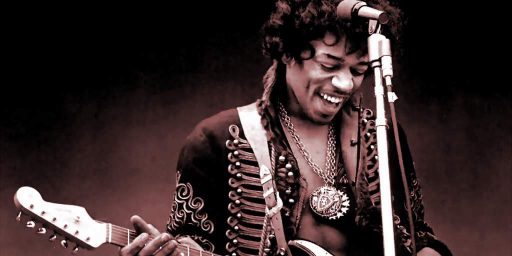
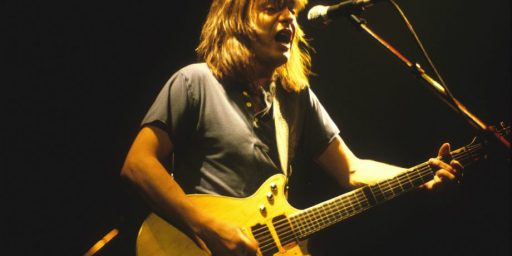
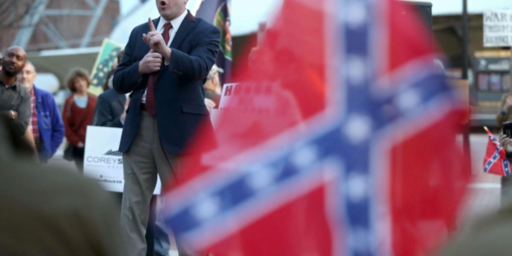
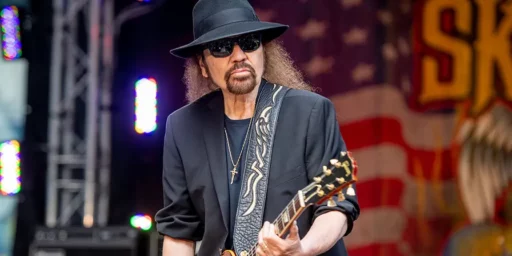

There is a cliche, “he was one with the instrument” and I wouldn’t understand what that was supposed to mean if I hadn’t heard Beck. Every note mattered, and every phrasing and intonation led you precisely to the intended place. For so many other guitarists the whammy bar was a gimmick or just a shortcut but he used it like a maestro coaxing the most profound emotion from an opera soloist. Someone said he was “one of one” and that was absolutely true. One of the very few guitarists in that category, with Hendrix and Django Reinhardt being the only other two that come to mind.
Well, today’s playlist is set. I hadn’t realized how vast his collaborations were!
When I heard the news yesterday, it struck me as odd that the oeuvre of the Yardbirds is seldom heard nowadays (at least on Sirius XM). That is a sad omission.
A guitar god’s god.
RIP.
Give our best to Jimi and SRV and Eddie, when you see them.
@MarkedMan:
There is a cliche, “he was one with the instrument” and I wouldn’t understand what that was supposed to mean if I hadn’t heard Beck.”
Exact same phenomenon when I first heard Beck, specifically this song, or a version of it: https://www.youtube.com/watch?v=hHHY3eRUMsM
@Neil Hudelson: Amazing. And it shows his jazz leanings in the way he dealt with a standard. Begin the song exactly as written and demonstrate that you understand it textually and emotionally, then move on to experimentation. And he never loses the thread.
As an 18 year old, extremely naive farm boy, I wandered to San Francisco in the Summer of ’69. Mind opening exposure to music we didn’t where I’d been farming potatoes, including Jefferson Airplane at the Fillmore West. Two other notable exposures were to the album, Traffic (by Traffic) and Truth, by Jeff Beck. Yeah, I was a Beatles fan and a Stones fan via radio exposure, but this was different.
For any Jeff Beck fans, this is standout stuff… incredible stuff… (along with Tal Wilkenfeld and Vinnie Colaiuta).
LINK
@motopilot:..⭐️⭐️⭐️⭐️⭐️!
Pure joy! Thank you.